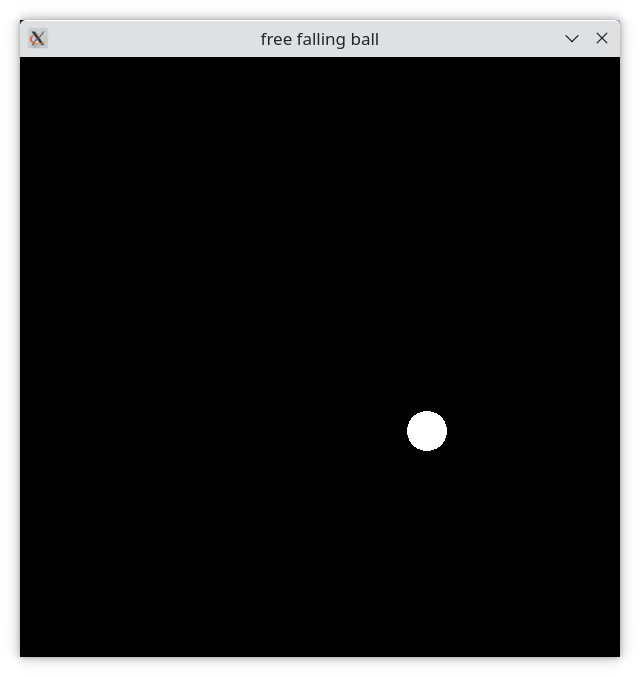基于EasyX和Raylib的自由落体小球

这个简陋的小游戏,在 《C和C++游戏趣味编程》 第三章, 是逐次迭代写成的。这里贴出基于 easyx 和 raylib 的各自实现。
基于 EasyX
// 根据《C和C++游戏趣味编程》第二章 仿真“自由落体小球” 写出
#include <graphics.h>
#include <conio.h> // _kbhit()
#include <stdio.h>
int mainxx()
{
const int screen_width = 600;
const int screen_height = 800;
initgraph(screen_width, screen_height, SHOWCONSOLE);
int y = 50;
int step = 1;
while (true)
{
y += step;
if (y > 620)
{
y = -20;
}
cleardevice();
fillcircle(300, y, 20);
Sleep(10);
}
getchar();
closegraph();
return 0;
}
// 显示窗口
void demo_2_1()
{
initgraph(600, 600, SHOWCONSOLE);
getchar();
closegraph();
}
// 显示一个静止小球
void demo_2_2_1()
{
initgraph(600, 600, SHOWCONSOLE);
fillcircle(300, 300, 100);
getchar();
closegraph();
}
// 显示多个小球
void demo_2_2_2()
{
initgraph(600, 800, SHOWCONSOLE);
fillcircle(300, 100, 50);
fillcircle(300, 250, 50);
fillcircle(300, 400, 50);
getchar();
closegraph();
}
// 利用变量修改小球位置
void demo_2_4_4()
{
int height = 800;
initgraph(600, height, SHOWCONSOLE);
fillcircle(300, 1 * height / 4, 50);
fillcircle(300, 2 * height / 4, 50);
fillcircle(300, 3 * height / 4, 50);
getchar();
closegraph();
}
// 小球下落动画
void demo_2_5_2()
{
int y = 100;
int step = 100;
initgraph(600, 600, SHOWCONSOLE);
for (int i = 0; i < 5; i++)
{
cleardevice();
fillcircle(300, y, 20);
Sleep(200);
y += step;
}
getchar();
closegraph();
}
// 利用if语句实现小球重复下落
void demo_2_7_1()
{
int y = 50;
initgraph(600, 600);
while (1)
{
y = y + 1;
if (y > 620)
{
y = -20;
}
BeginBatchDraw();
{
cleardevice();
fillcircle(300, y, 20);
Sleep(10);
}
EndBatchDraw();
}
closegraph();
}
// 小球落地反弹
void demo_2_8_2()
{
int y = 50;
int vy = 3;
initgraph(600, 600);
while (1)
{
y = y + vy;
if (y >= 620)
{
vy = -vy;
}
BeginBatchDraw();
cleardevice();
fillcircle(300, y, 20);
Sleep(10);
EndBatchDraw();
}
getchar();
closegraph();
}
// 小球加速下落
void demo_2_9_3()
{
float y = 100;
float vy = 0;
float g = 0.5;
initgraph(600, 600);
while (1)
{
vy = vy + g;
y = y + vy;
if (y >= 580)
{
vy = -0.95 * vy;
}
if (y > 580)
{
y = 580;
}
BeginBatchDraw();
cleardevice();
fillcircle(300, y, 20);
Sleep(10);
EndBatchDraw();
}
getchar();
closegraph();
}
// 抛物线运动的小球
void ex_2_8()
{
float x = 100;
float y = 200;
float vx = 8;
float vy = 0;
float g = 0.5;
initgraph(600, 600);
while (1)
{
vy = vy + g;
x = x + vx;
y = y + vy;
if (y >= 580)
{
vx = 0.98 * vx; // x方向速度受阻尼影响变小
vy = -0.95 * vy; // y方向速度改变方向,并受阻尼影响变小
}
if (y > 580)
{
y = 580;
}
if (x >= 580)
{
vx = -vx;
}
if (x <= 20)
{
vx = -vx;
}
BeginBatchDraw();
cleardevice();
fillcircle(x, y, 20);
Sleep(10);
EndBatchDraw();
}
getchar();
closegraph();
}
int main()
{
//demo_2_1();
//demo_2_2_1();
//demo_2_2_2();
//demo_2_4_4();
//demo_2_5_2();
//demo_2_8_2();
//demo_2_9_3();
ex_2_8();
return 0;
}
基于 Raylib
// 根据《C和C++游戏趣味编程》第二章 仿真“自由落体小球” 写出
#include "raylib.h"
#include <stdio.h>
#include <stdlib.h>
// 显示窗口
void demo_2_1()
{
InitWindow(600, 600, "free falling ball");
SetTargetFPS(60);
while (!WindowShouldClose())
{
// Draw
BeginDrawing();
{
ClearBackground(BLACK);
}
EndDrawing();
}
CloseWindow();
}
// 显示一个静止小球
void demo_2_2_1()
{
InitWindow(600, 600, "free falling ball");
SetTargetFPS(60);
while (!WindowShouldClose()) {
// Draw
BeginDrawing();
{
ClearBackground(BLACK);
DrawCircle(300, 300, 100, WHITE);
}
EndDrawing();
}
CloseWindow();
}
// 显示多个小球
void demo_2_2_2()
{
InitWindow(600, 800, "free falling ball");
SetTargetFPS(60);
while (!WindowShouldClose()) {
// Draw
BeginDrawing();
{
ClearBackground(BLACK);
DrawCircle(300, 100, 50, WHITE);
DrawCircle(300, 250, 50, WHITE);
DrawCircle(300, 400, 50, WHITE);
}
EndDrawing();
}
CloseWindow();
}
// 利用变量修改小球位置
void demo_2_4_4()
{
int height = 800;
InitWindow(600, height, "free falling ball");
SetTargetFPS(60);
while (!WindowShouldClose())
{
// Draw
BeginDrawing();
{
ClearBackground(BLACK);
DrawCircle(300, 1 * height / 4, 50, WHITE);
DrawCircle(300, 2 * height / 4, 50, WHITE);
DrawCircle(300, 3 * height / 4, 50, WHITE);
}
EndDrawing();
}
CloseWindow();
}
// 小球下落动画
void demo_2_5_2()
{
int y = 100;
InitWindow(600, 600, "free falling ball");
SetTargetFPS(5);
int step = 100;
int cnt = 0;
while (!WindowShouldClose())
{
// Update
cnt++;
// Draw
BeginDrawing();
{
ClearBackground(BLACK);
DrawCircle(300, y, 20, WHITE);
if (cnt < 6)
{
y += step;
}
}
EndDrawing();
}
CloseWindow();
}
// 小球下落动画
void demo_2_7_1()
{
InitWindow(600, 600, "free falling ball");
SetTargetFPS(60);
int y = 50;
while (!WindowShouldClose())
{
// Update
y = y + 1;
if (y > 620)
{
y = -20;
}
// Draw
BeginDrawing();
{
ClearBackground(BLACK);
DrawCircle(300, y, 20, WHITE);
}
EndDrawing();
}
CloseWindow();
}
// 小球落地反弹
void demo_2_8_2()
{
InitWindow(600, 600, "free falling ball");
SetTargetFPS(100);
int y = 50;
int vy = 3;
while (!WindowShouldClose())
{
// Update
y = y + vy;
if (y >= 620)
{
vy = -vy;
}
// Draw
BeginDrawing();
{
ClearBackground(BLACK);
DrawCircle(300, y, 20, WHITE);
}
EndDrawing();
}
CloseWindow();
}
// 小球加速下落
void demo_2_9_3()
{
InitWindow(600, 600, "free falling ball");
SetTargetFPS(60);
float y = 100;
float vy = 0;
float g = 0.5;
while (!WindowShouldClose())
{
// Update
vy = vy + g;
y = y + vy;
if (y >= 580)
{
vy = -0.95 * vy;
}
if (y > 580)
{
y = 580;
}
// Draw
BeginDrawing();
{
ClearBackground(BLACK);
DrawCircle(300, y, 20, WHITE);
}
EndDrawing();
}
CloseWindow();
}
// 抛物线运动的小球
void ex_2_8()
{
InitWindow(600, 600, "free falling ball");
SetTargetFPS(60);
float x = 100;
float y = 200;
float vx = 8;
float vy = 0;
float g = 0.5;
while (!WindowShouldClose())
{
// Update
vy = vy + g;
x = x + vx;
y = y + vy;
if (y >= 580)
{
vx = 0.98 * vx; // x方向速度受阻尼影响变小
vy = -0.95 * vy; // y方向速度改变方向,并受阻尼影响变小
}
if (y > 580)
{
y = 580;
}
if (x >= 580)
{
vx = -vx;
}
if (x <= 20)
{
vx = -vx;
}
// Draw
BeginDrawing();
{
ClearBackground(BLACK);
DrawCircle(x, y, 20, WHITE);
}
EndDrawing();
}
CloseWindow();
}
int main()
{
//demo_2_1();
//demo_2_2_1();
//demo_2_2_2();
//demo_2_4_4();
//demo_2_5_2();
//demo_2_7_1();
//demo_2_8_2();
//demo_2_9_3();
ex_2_8();
return 0;
}
Greatness is never a given, it must be earned.



